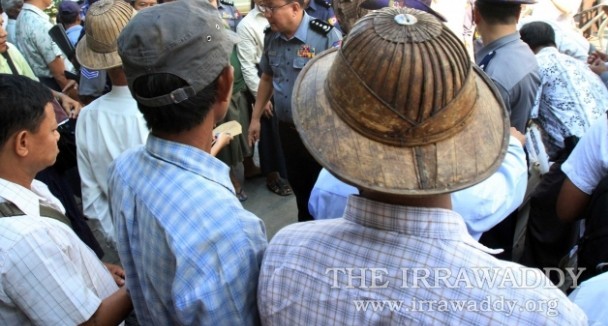While foreign governments heap praise on the Burmese government’s liberal tilt, land theft appears to be increasing as state agencies and powerfully placed domestic firms position themselves to welcome foreign investment.
Farmers across the country are being muscled out of their fields with little hope of appeal to the law. This is because despite all the trumpeting in the West about President Thein Sein’s “reforms,” the rule of law in Burma is closer to 12th Century Europe than the 21st Century.
In medieval Europe, land ownership was determined by sharp swords and private armies. In present-day Burma, powerful businesses linked to the army do much the same.
Land confiscation is being reported near the south coast, in the Rangoon region, around Mandalay and in northern areas close to the border with China.
Farmers and their families are being forcibly moved for major projects, such as the oil and gas pipelines being built through the country from the Bay of Bengal to the Chinese border, and for smaller industrial projects by firms with long crony links to the military.
Even where the local authorities have sided with expelled farmers, big businesses feel confident enough to ignore them. Just last week, The Irrawaddy reported how industrial firm Zay Kabar has continued to bulldoze snatched land despite a stop order issued by the administrative office of the Rangoon area’s Mingaladon Township.
Zay Kabar is owned by Khin Shwe, a member of Parliament for the ruling Union Solidarity and Development Party.
“[Burma] faces new challenges, notably as former military personnel move into new roles in other sectors including industry, carrying with them their previous authority,” the Asian Human Rights Commission said in a recent submission to United Nations Human Rights Council.
“The convergence of the military, government agents and business is an enormously dangerous development, as can been seen in the increasingly grave problem of land-grabbing.”
The commission alleged that 70 percent of court cases in Burma are “decided in part or whole by the payment of money. As economic boom increases the money within the system, the effect of corruption will only grow.”
Business investment risk assessor Maplecroft, based in Britain, says that despite the widespread praise for supposed political reforms, Burma continues to come to the top of its poor rule of law index. It says the government continues to dictate judicial decisions.
“Tangible improvements in the rule of law, including increased judicial independence and greater transparency in the regulatory system, will be required before the long-term potential of the economy can be realized,” Maplecroft says.
Claiming ownership of a slice of land, especially in potential development areas around the bigger conurbations or tourist attractions, will enhance Burmese businesses looking to attract wealthier foreign investment partners.
Land ownership has been vague since the 1960s when most of it was nationalized during the socialist reign of Ne Win. Successive military rules have eroded the rule of law so that questions of ownership depend more on political influence or money than any historic right.
A new land law is supposed to be under debate in the Burmese Parliament but it has been subject to very little open analysis and some observers think it will merely strengthen the ability of military-linked businesses to claim they are acting within the law when they decide they want a piece of land.
“Existing laws do little to prevent confiscation by government-aligned figures, and that looks set to continue if a bill currently being debated in Parliament comes into force,” said a report by the Democratic Voice of Burma. “The Land Act will effectively allow powerful tycoons to monopolize arable land and force off small-scale farmers,” it concluded.
One of the biggest land grabs has occurred in recent weeks in Sagaing Division, where scores of people in three villages have been ordered to leave their homes in a bid to take over 7,500 acres, reportedly for copper mining projects.
The Union of Myanmar Economic Holdings (UMEH), run by the military in various guises, and Chinese businesses are involved in these land confiscations.
“These incidents mirror what has gone on in China over the past 20 or more years as the economic boom has demanded more and more agricultural land for projects ranging from coal mines to hydroelectric dam systems,” Hong Kong energy industries analyst Jeff mead told The Irrawaddy. “The absence of a proper rule of law has made it difficult for people to resist but today in China there is a more emboldened public prepared to make protests heard.”
One positive consequence of the current reformed-minded government is that aggrieved people in Burma are less frightened of publicly objecting to injustice. This is illustrated by the legal action being taken this month by several farmers who had land confiscated from them last year in the Mandalay area.
About 40 acres of the farmers’ land was taken by yet another military body, the Bureau of Air Defense, in cahoots with a firm called High Tech Concrete, which is owned by noted army-linked businessman Aik Tun.
Such bold action is not without serious risks though. Five farmers in the Magwe Division who sued UMEH and the Htoo Trading Company last year over land confiscation ended in prison.
The farmers’ land was taken to build a caustic soda factory. The farmers were jailed for allegedly offensive comments, trespass and “violation” of the law.
The UN Economic and Social Commission for Asia-Pacific warned last week that although Burma seems to be on the brink of “tremendous opportunity,” there remained a danger that the chief beneficiaries would be the well-placed business cronies of the military establishment.
All the signs are that without the rule of law and an independent judiciary, this is exactly what’s happening.

















